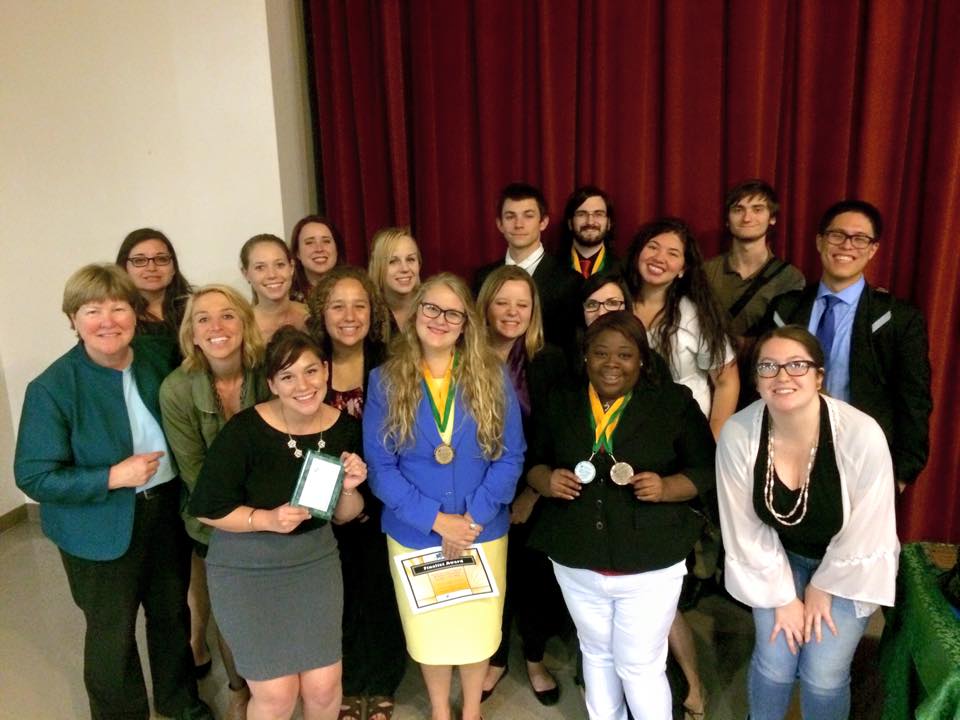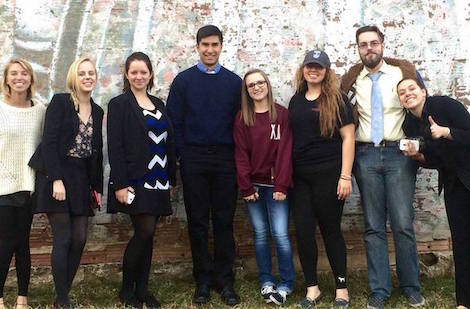Follow us on Facebook
Support the team
About NAU forensics
Our team participates in a CST 116 or CST 316 which are hands-on workshops that helps students practice speaking persuasively and professionally, writing with clarity and precision, adapting to various audiences, and critically analyzing literature and research texts. The course introduces students to competitive speaking and debating. Its goal is to improve students’ skills in speaking, listening, research and writing, and reasoning through practice. Intercollegiate competitions are a primary focus of this course and students can participate in local, state, and national level forensics tournaments.

Debate
British Parliamentary/Parliamentary debate
A two-person team debate, based on limited preparation. Each round, the team will be assigned a topic and a side (affirming or negating a topic), and given twenty minutes to prepare arguments. The use of the Internet may or may not be allowed during preparation time depending on a tournament’s style. During the round, the only materials allowed into the round itself are handwritten arguments prepared by each team in the 20 minutes prior to the round. At the end of the debate, the judge will decide on a winning team.
Lincoln-Douglas Debate
A one-person policy debate, based on a single yearlong topic. It is a communication event, by which we mean the philosophy of the activity is consistent with that which governs other individual events. The use of prepared evidence is necessary in this event. Competitors will be evaluated on their analysis, through a stock issues paradigm. At the end of the debate, the judge will decide on a winning team.

Individual events
Limited preparation
Extemporaneous speaking:
For each round, contestants will select one of three topics on current national and international events. The contestant will have thirty minutes to prepare a five to seven minute speech on the topic selected. Notes are permissible but should be at a minimum. Maximum 7 minutes.
Impromptu speaking:
Contestants will receive short excerpts dealing with items of general interest, political, economic, and social issues. The contestant will have a total of seven minutes to divide between preparation and speaking. Students should speak for at least three minutes. All contestants in the same section shall speak on the same topic. Maximum 7 minutes.
Platform events
Persuasion:
A speech to convince, to move to action, or to inspire on a significant issue, delivered from memory. Maximum time is 10 minutes.
Communication Analysis/Rhetorical Criticism: Contestants will deliver an original critical analysis of any significant rhetorical artifact. The speaker should limit the quotation of, paraphrasing of, or summary of, the analyzed artifact to a minimum. Any legitimate critical methodology is permissible as long as it serves to open up the artifact for the audience. The speech must be delivered from memory. Maximum 10 minutes.
Informative speaking:
The contestant will deliver an original factual speech on a realistic subject to fulfill a general information need of the audience. Visual aids that supplement/reinforce the message are permitted. The speech must be delivered from memory. Maximum 10 minutes.
After-dinner speaking:
Each contestant will present an original speech whose purpose is to make a serious point through the use of humor. The speech should reflect the development of a humorous comedic effort, not a stand up comedy routine. The speech must be memorized. Maximum 10 minutes.
Interpretation events
Prose:
The contestant will present a program of prose literature. Original introductory comments and transitional remarks are permitted. Programs may consist of single or multiple selections. Plays are not permitted. Manuscripts are required. Maximum 10 minutes.
Poetry:
The contestant will present a program of poetic literature. Original introductory comments and transitional remarks are permitted. Programs may consist of single or multiple selections. Manuscripts are required. Maximum 10 minutes.
Dramatic duo:
A cutting from a play, humorous or serious, involving the portrayal of two or more characters presented by two individuals. This is not an acting event. Thus, costumes, props, etc. are not permitted. Presentation must be from manuscript and focus should be off stage. Maximum 10 minutes.
Dramatic interpretation:
The contestant will perform dramatic literature, humorous or serious, that represents one or more characters from material of literary merit. This material may be drawn from stage, screen, or radio. Programs may consist of single or multiple selections. Manuscripts are required. Maximum 10 minutes.